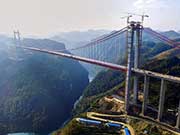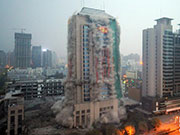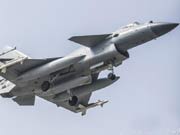

Competitor Jeff Bezos, who achieved a similar success last month, tweeted: 'Congrats on landing Falcon's suborbital booster stage. Welcome to the club!'
'Their plan is to try to land (the next booster) out here on the Cape-side,' said Carol Scott of Nasa's Commercial Crew Program, shortly after she discussed the plan with a SpaceX executive.
Three previous attempts by the company to land a rocket on a barge in the ocean were 'almost successful'.
The water-based landings were always meant as practice for boosts returning to land, where they can be more easily recovered.
The company wants to land the first stages of Falcon 9 rockets so that they can be flown again, dramatically saving on launch costs.
And it isn't the only one. Last month, Amazon founder, Jeff Bezos's successfully landed a rocket at a launch site in Texas.
Bezos proudly tweeted: 'The rarest of beasts - a used rocket. Controlled landing not easy, but done right, can look easy.'
But Musk immediately hit back at the achievement, with: 'Not quite 'rarest'. SpaceX Grasshopper rocket did 6 suborbital flights three years ago and is still around.'
The Grasshopper made eight flights and landings before it was retired in late 2013, but the highest it ever flew was around half a mile.
In comparison, Bezos' New Shepard rocket blasted off from Blue Origin's West Texas launch site at 12:21pm CST (18.21 GMT) yesterday.
It reached a suborbital altitude of 62 miles (100 km) – much farther than the Grasshopper - and landed back at the launch site eight minutes later.
In suborbital spaceflight, rockets are not traveling fast enough to reach the speed required to counter the pull of Earth's gravity.
This means they re-enter the atmosphere like a ballistic missile, but the only visible damage to the rocket is scorched metal at its base.
Being able to re-fly a rocket will slash launch costs, a game-changer for the space industry.
'When you lower the cost of access to space very significantly you will change the markets, you will change what's possible,' Bezos said.
Regardless of its distance, Musk didn't think that the 'suborbital' achievement was that much to shout about.
'Jeff maybe unaware SpaceX suborbital VTOL flight began 2013. Orbital water landing 2014. Orbital land landing next', he wrote.
He wanted to set the record straight on what is considered to be 'space.' Suborbital flights, he said, are completely different to 'orbital' flights which are required to send humans to Mars.
Last month, Amazon founder, Jeff Bezos (right) successfully landed a rocket at a launch site in Texas. Bezos proudly tweeted: 'The rarest of beasts - a used rocket. Controlled landing not easy, but done right, can look easy.' But Elon Musk (right) immediately hit back at the achievement, with: 'Not quite 'rarest'. SpaceX Grasshopper rocket did 6 suborbital flights three years ago and is still around'
 |  |
Day|Week

 Spectacular aerial photos of the Three Gorges
Spectacular aerial photos of the Three Gorges Admit it! That is a High-way built by China
Admit it! That is a High-way built by China Photos of Beijing Film Academy student hit the Internet
Photos of Beijing Film Academy student hit the Internet Spectacular aerial photos of the Three Gorges
Spectacular aerial photos of the Three Gorges New balls please! Polish sports stars strip off for risqué calendar
New balls please! Polish sports stars strip off for risqué calendar A glance at life of Ukrainian models working in Chongqing
A glance at life of Ukrainian models working in Chongqing Contestants of Mrs. Globe pose for photo in Shenzhen
Contestants of Mrs. Globe pose for photo in Shenzhen
 Bikini models attend hot pot banquet in Hefei
Bikini models attend hot pot banquet in Hefei 118-meter-high Never-used Building in NW. China Demolished
118-meter-high Never-used Building in NW. China Demolished J-10B fighters with homegrown engine in test flight
J-10B fighters with homegrown engine in test flight